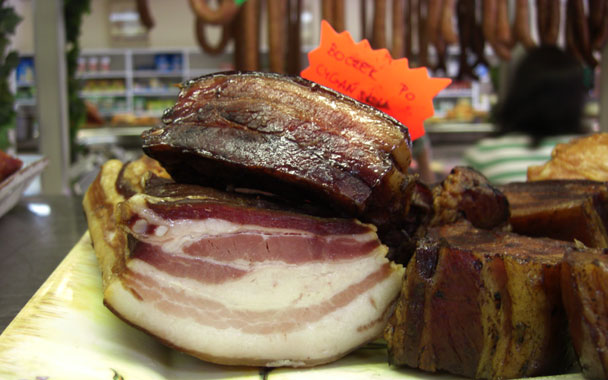Recently, I’ve been thinking a lot about bacon. I mean, even more than usual. I’ve been thinking about one particular chunk of bacon and what it says about the people who eat it. I crossed its path only a few weeks ago, and it may have changed the way I will think about bacon from now on. It’s twice as good as normal bacon—it’s double-smoked.
On a rainy morning, not long ago, I piled in the car with some friends and headed to the mostly Polish (and in recent years, increasingly yuppie-filled) Brooklyn neighborhood called Greenpoint. It was a Saturday morning, and there was an old-time doughnut shop we needed to check out.
The doughnuts at Peter Pan Doughnuts and Pastries, by the way, are awesome. In fact MSN listed Peter Pan as one of the nation’s top doughnut shops. That’s quite a claim. We waited for seats, which at the moment were occupied by equal ratios of grizzled, elderly Polish immigrants who have probably seen too much, and younger Connecticut immigrants who have probably always had too much. But there is an equalizing fairness in having your lips covered with powdered sugar. We are all the same in the eyes of the cruller. So the three of us split a baker’s dozen, two egg sandwiches, and five coffees. Afterward we wandered, somewhat dazed with sugar and caffeine, out into the drizzle.
Across the street from the doughnut shop stood a small glass-front store. “POLSKI,” read the crimson letters hanging from the window, and behind them hung kielbasa. Kielbasa has a beckon about it, a way of drawing you in. Inside the shop, on top of the counter, sat my bacon, glistening like a smokehouse jewel.
I asked the girl at the counter about the bacon. Why was it not in the display case with the rest of the bacon? “Double-smoked is better,” she said, her voice thick and matter-of-fact. There is comfort in the stark firmness of an Eastern European accent.
Double-smoked bacon has its roots in Eastern Prussia, the land that has in part become modern-day Poland, Lithuania, and the Czech Republic. In Eastern Germany, butchers commonly sell the smoldered pig belly under the name Geräucherter Speck. But for reasons unfathomable to me, it has not reached the same level of popularity in this country (although you can buy it here). Perhaps it’s the lack of injected brine solution so commonly found in American bacons, or the missing nitrates. Maybe it’s the lengthy smoking process: This special bacon is smoked for up to 24 hours (compare that to commercially produced American bacon, which spends just four to six hours in the smoker, if that—in many cases the meat is simply injected with liquid smoke). Stateside, time is money, so double-smoked bacon is more expensive.
It is also well worth the price, as I discovered soon after buying a chunk that morning in the shop. Indeed, double-smoked is better. Its smokiness has a depth and strength not found in other bacons. It’s a depth that brings solace enough to ease the sting of a bleak Polish winter, or the drabness of a rainy Brooklyn morning. And there is a sweetness so subtle that it is barely noticeable. A sweetness similar to the half smile I received from the Polish butcher girl as she noticed my excitement over one of her homeland’s edible treats.
Now tell me: What does your bacon say about you?




 Pinterest
Pinterest


